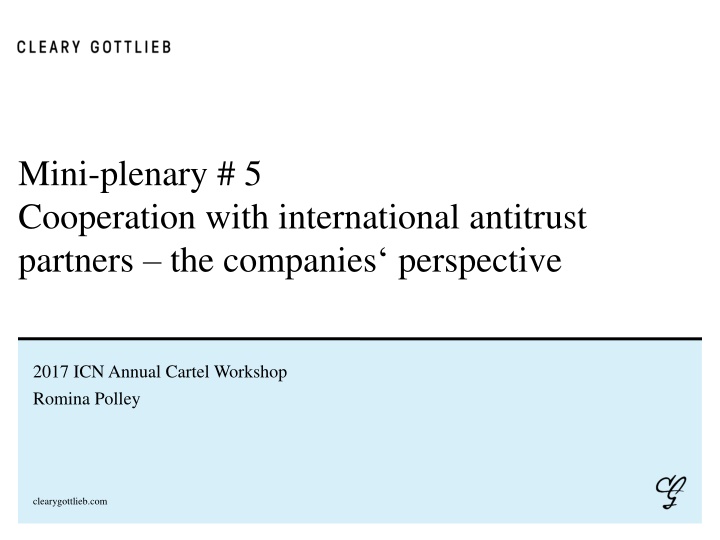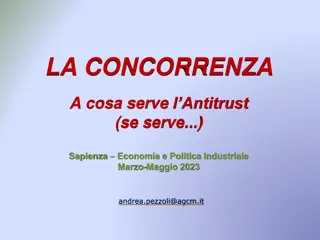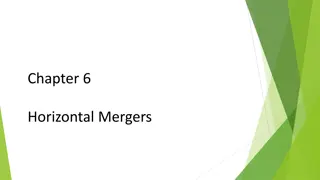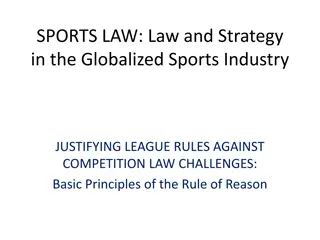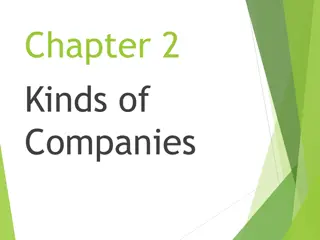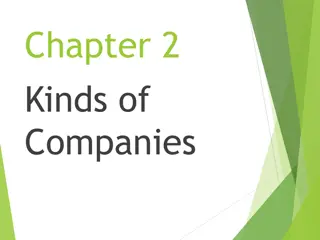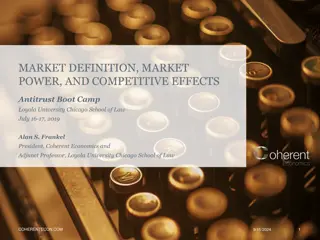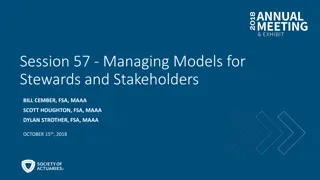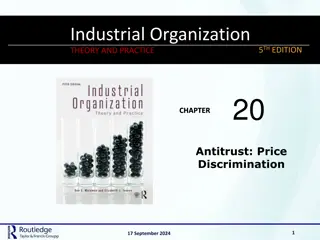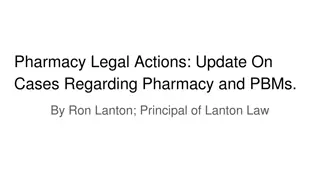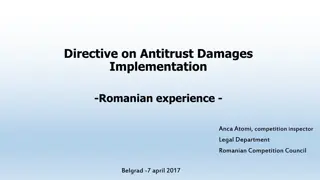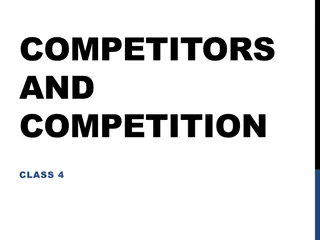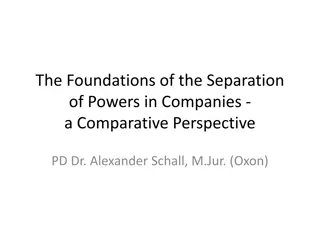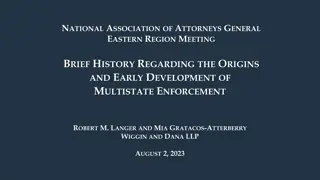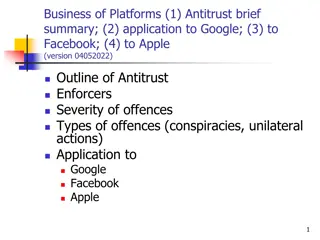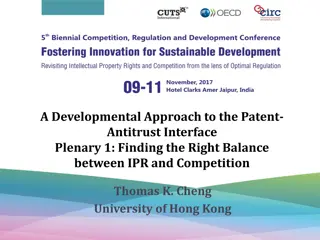Cooperation with International Antitrust Partners: Companies' Perspective
This content discusses the types of inter-agency cooperation, risks to leniency arising from multiple investigations, the interest of defending companies in cooperation, and leniency applicants' interest in cooperation with a focus on international antitrust partners from the companies' perspective. It highlights the benefits and challenges of cooperation between agencies in cartel investigations, emphasizing the importance of collaboration to streamline processes, avoid duplication, and achieve consistent outcomes.
Download Presentation

Please find below an Image/Link to download the presentation.
The content on the website is provided AS IS for your information and personal use only. It may not be sold, licensed, or shared on other websites without obtaining consent from the author.If you encounter any issues during the download, it is possible that the publisher has removed the file from their server.
You are allowed to download the files provided on this website for personal or commercial use, subject to the condition that they are used lawfully. All files are the property of their respective owners.
The content on the website is provided AS IS for your information and personal use only. It may not be sold, licensed, or shared on other websites without obtaining consent from the author.
E N D
Presentation Transcript
Mini-plenary # 5 Cooperation with international antitrust partners the companies perspective 2017 ICN Annual Cartel Workshop Romina Polley clearygottlieb.com
Types of Inter-Agency Cooperation Exchange of information on planned or pending proceedings Coordination of investigative steps and work allocation Exchange of evidence and other information from the file Coordination on level of fine and legal assessment, e.g. qualification of infringement, domestic impact Putting proceedings on ice in case of parallel investigation(s) Cooperation in enforcement of decisions Multilateral cooperation, e.g. within the ECN Bilateral cooperation agreements, e.g. US/EU Voluntary cooperation, e.g. ICN 2 2017 ICN Annual Cartel Workshop
Risks to Leniency Arising from Multiple Investigations Multi-jurisdictional cartel investigations including countries with little domestic impact increase unpredictability for applicants Unknown financial exposure Double jeopardy risk Increased risk that confidential information is not protected Differences in leniency programs and evidence standards Rights of defense at risk Enlargement of notion of hardcore cartel has created uncertainty and clogs the system Information exchange Hub & Spoke No uniform treatment of secrecy requirement Publication/disclosure of evidence to third parties 3 2017 ICN Annual Cartel Workshop
Interest of Defending Company in Cooperation Defending company in general concerned about inter-agency cooperation because of Risk of higher number of investigations Heightened risk of discovery of evidence Increased risk of disclosure of confidential information Higher risk of prosecution of individuals But cooperation between agencies may help to Avoid multiple jeopardy with regard to fines Achieve consistent qualification of conduct Allocate work between CAs leading to less cumbersome investigations 4 2017 ICN Annual Cartel Workshop
Leniency Applicants Interest in Cooperation Leniency applicant more interested in inter-agency cooperation than defending company because of the following advantages: Faster clarity on which agencies pursue the relevant conduct Reduced burden on the applicant s duty to cooperate, e.g. if investigative steps are coordinated Soft harmonization of the handling of leniency programs, e.g. qualification of conduct and concept of value added Avoidance of multiple jeopardy issues for lower ranking applicants But significant risk of Uncontrolled dissemination of confidential leniency information Inability to protect individuals from prosecution Rights of defense being neglected 5 2017 ICN Annual Cartel Workshop
Harmonized Domestic Impact Test Needed Current lack of domestic impact threshold in certain jurisdictions leads to Disproportionate and unfair procedures and fines Adverse impact on leniency because it Creates uncertainty on number of investigations and exposure Bears the risk of different ranks in different jurisdiction Lack of predictability on number of investigations deters applicants from making applications altogether or leads to unnecessary applications 6 2017 ICN Annual Cartel Workshop
Protection of Leniency Information CAs should be transparent about level of protection they can offer for confidential leniency information from disclosure to third parties, e.g. public prosecutors or follow-on damages plaintiffs Adoption of ECN safeguards on leniency information would be desirable No opening of investigation based on procedural information on leniency application in other jurisdiction Commitment to respect professional legal privilege Restriction of use of leniency information for cartel procedure Consent of applicant required or parallel leniency applications or guarantee by CA that no sanction on company or individuals Protection of individuals from sanctions if difference in procedural safeguards between jurisdictions 7 2017 ICN Annual Cartel Workshop
Fine-tuning Criminal Liability with Leniency Lack of alignment of leniency programs and criminal liability creates disincentive to apply for leniency Immunity applicant s privilege should extend to criminal liability; otherwise no incentive to apply for leniency Also risk of criminal liability for lower-ranking leniency applicants deters from making an application Leniency information should not be used to establish criminal liability of individuals in other jurisdictions Carve-outs should be coordinated at international level 8 2017 ICN Annual Cartel Workshop
Respect for Rights of Defense Inter-agency cooperation should help avoid infringement of rights of defense in less experienced jurisdictions No right to counsel during interviews Excessive number and duration of interviews Insufficient legal professional privilege Lack of identification of suspected infringement in RFIs Pursuit of time-barred conduct Excessive RFIs with very short deadlines Violations of right of access to evidence Over-interpretation of duty to cooperate ICN cooperation could help raise the standard ECN + Draft Directive approach to rights of defense to be criticized 9 2017 ICN Annual Cartel Workshop
Possible Improvements to Ensure Success of Leniency Restraint on the part of the CAs in opening multiple investigations More coordination between experienced authorities and less experienced enforcers Soft harmonization on scope of hardcore cartel and leniency programs, e.g. ICN manual on drafting and implementing effective leniency programs Proportional interpretation of cooperation duty of applicant Protect leniency information from disclosure to third parties Fine-tune criminal liability with approach to sanctions in leniency programs Increase of CAs own detection activity, e.g. datascreening to detect cartels and other techniques 10 2017 ICN Annual Cartel Workshop
